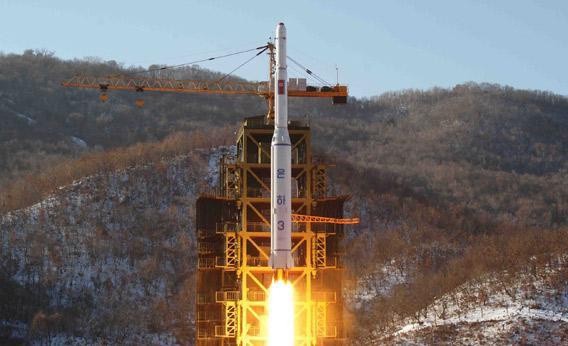The United Nations voted to tighten economic sanctions against North Korea on Tuesday, and the international pariah responded by threatening to conduct another nuclear test. After so many rounds of trade restrictions on North Korea, is there anything left to sanction?
Tons of stuff. You can’t sell weapons or luxury goods (caviar, handbags, yachts, etc.) to anyone in the hermit kingdom. Otherwise, American companies are relatively free to peddle their wares in North Korea, as long as they avoid approximately 100 individuals, companies, and government agencies that have been blacklisted by the United States or the United Nations. (When the U.N. tightens sanctions, it’s often just a matter of adding more entities to the list.) Importing goods from North Korea, in contrast, requires a special license from the Treasury Department—but there’s not much to buy from the Democratic People’s Republic of Korea. Overall, economic restrictions on North Korea are light compared with other countries that are out of favor with the U.S. government, and the administration has left plenty of room to tighten the sanctions on Kim Jong-un. It could, for example, apply blanket trade restrictions on the DPRK, as it has against Iran, Cuba, and Syria.
That doesn’t mean trading with North Korea is easy or that the administration encourages it. The United States government offers several programs to facilitate trade with other countries. Let’s say, for example, that you wanted to export diapers to France. The Export-Import Bank of the United States would offer you a loan to buy polyethylene and fragrance to make the product and trucks to ship your wares. It may also loan money to your buyers abroad and insure you against their nonpayment. However, if you’re selling to a Marxist-Leninist state like North Korea, the Export-Import Bank won’t help you. (China, incidentally, is not considered a Marxist-Leninist state, so Chinese trading partners are eligible for loans from the bank.) Or maybe you’re looking to open a factory abroad, which will make potato chips for import into the United States. The federal government’s Overseas Private Investment Corporation could loan you money for an industrial deep fryer and some potatoes, but not if you try to build your plant in the hermit kingdom.
These impediments, combined with the lack of capital in North Korea, keep U.S. trade levels with the DPRK very low. Total exports to North Korea for 2012 were less than $12 million, and in some months there was no trade at all. By comparison, the United States sold nearly $39 billion worth of goods to South Korea last year.
Not every country takes the North Korea sanctions as seriously as the United States does. The vagueness of U.N. resolutions accounts for some of the laxity. The ban on the sale of luxury goods, for example, doesn’t say what constitutes a luxury good, leaving member states to create their own definitions. The European Union has a specific list of banned items, including expensive cigars, vehicles, and electronics, among many other items. China has been vague about its definition of “luxury,” but by the U.S. or EU definition, the Asian giant sold more than $136 million worth of luxury goods to North Korea in 2009 alone, with tobacco, cars, and computers making up the bulk of the trade.
Many U.N. member states don’t support or simply don’t care about the sanctions. More than 100 countries have failed to file reports to the United Nations about their trade with North Korea. Using a complex network of shell companies, North Korean entities have been fairly successful at circumventing sanctions, presumably with the knowledge of their trading partners in some cases.
Got a question about today’s news? Ask the Explainer.
Explainer thanks Stephen M. Haggard of the University of California–San Diego.
